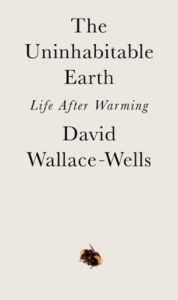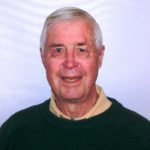 Is global warming a sensible hypothesis? Is it happening? What may be its consequences? What can and should we, as human beings, do about it?
Is global warming a sensible hypothesis? Is it happening? What may be its consequences? What can and should we, as human beings, do about it?
These are some of the most important questions facing us today. David Wallace-Wells begins with startling pessimism, moving on to despair, but he finally concludes with a modest sense of optimism. Thank goodness … at least for this reader.
He tests our ability to continue reading in an ominous Chapter 2, some 100 pages of possible woe: heat death, hunger, drowning, wildfires, disasters (no longer natural). freshwater drain, dying oceans, unbreathable air, plagues of warming, economic collapse, climate “conflict”, and “systems” collapses.
What a challenge!
As the author writes at its end, “If you have made it this far, you are a brave reader.” It confirms Pogo’s famous law: “We have met the enemy, and he is us.”
This analysis leads Wallace-Wells to suggest how we might respond: “But climate change inverts the (human) perspective – giving us not a deep time of permanence but a deep time of cascading, disorienting change, so deep that it mocks any pretense of permanence on the planet.” Does this then enhance the delusions of apocalypse believers?
What do other think of this proposition?
John Lancaster, writing in The New York Times (4/28/19) says: “a remorseless, near unbearable account of what we are doing to our planet.”
From The Economist (5/25/19): “[the book explores the] … causal link between climate change and conflict (encompassing everything from interpersonal to large-scale violence.)”
From the New Scientist (4/27/19): “The goal should not be net-zero carbon emissions, as fast as possible. How fast is feasible is a legitimate matter for debate.”
Dana Wilde, writing in The Working Waterfront (9/20/19) notes: “Reading the book’s first sections is like being caught in a carpet-bombing.”
Buried in the author’s notes is a conclusion by Paul Kingsnorth, from Dark Ecology (2012): “The answer is that it leaves you with an obligation to be honest about here you are in history’s great cycle, and what you have the power to do, and what you don’t.” At least, we can try.
Then Wallace-Wells counsels that the problem stems from “ … both human humility and human grandiosity … If humans are responsible for the problem, they must be capable of undoing it … it is an acceptance of responsibility.”
My personal counsel: “Don’t despair; respond!” Or perhaps, to my offspring, “Go North, young people, and go inland!”
Editor’s Note: The Uninhabitable Earth: Life After Warming by David Wallace-Wells, was published by Tim Duggan Books, New York, 2019 .

About the Author: Felix Kloman is a sailor, rower, husband, father, grandfather, retired management consultant and, above all, a curious reader and writer. He’s explored how we as human beings and organizations respond to ever-present uncertainty in two books, ‘Mumpsimus Revisited’ (2005) and ‘The Fantods of Risk’ (2008). A 20-year resident of Lyme, he now writes book reviews, mostly of non-fiction, a subject which explores our minds, our behavior, our politics and our history. But he does throw in a novel here and there.
For more than 50 years, he’s put together the 17 syllables that comprise haiku, the traditional Japanese poetry, and now serves as the self-appointed “poet laureate” of Ashlawn Farm Coffee, where he may be seen on Friday mornings. His late wife, Ann, was also a writer, but of mystery novels, all of which begin in a village in midcoast Maine, strangely reminiscent of the town she and her husband visited every summer.